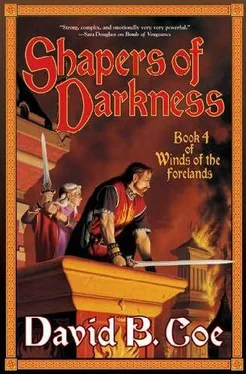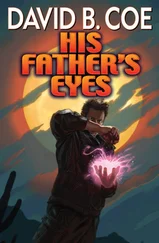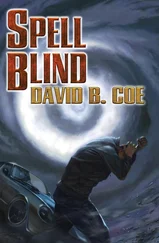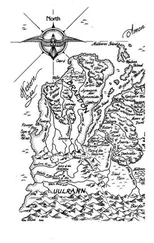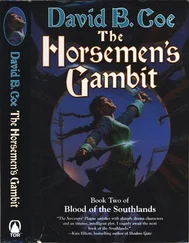David Coe - Shapers of Darkness
Здесь есть возможность читать онлайн «David Coe - Shapers of Darkness» весь текст электронной книги совершенно бесплатно (целиком полную версию без сокращений). В некоторых случаях можно слушать аудио, скачать через торрент в формате fb2 и присутствует краткое содержание. Год выпуска: 2010, Издательство: Macmillan, Жанр: Фэнтези, на английском языке. Описание произведения, (предисловие) а так же отзывы посетителей доступны на портале библиотеки ЛибКат.
- Название:Shapers of Darkness
- Автор:
- Издательство:Macmillan
- Жанр:
- Год:2010
- ISBN:нет данных
- Рейтинг книги:3 / 5. Голосов: 1
-
Избранное:Добавить в избранное
- Отзывы:
-
Ваша оценка:
- 60
- 1
- 2
- 3
- 4
- 5
Shapers of Darkness: краткое содержание, описание и аннотация
Предлагаем к чтению аннотацию, описание, краткое содержание или предисловие (зависит от того, что написал сам автор книги «Shapers of Darkness»). Если вы не нашли необходимую информацию о книге — напишите в комментариях, мы постараемся отыскать её.
Shapers of Darkness — читать онлайн бесплатно полную книгу (весь текст) целиком
Ниже представлен текст книги, разбитый по страницам. Система сохранения места последней прочитанной страницы, позволяет с удобством читать онлайн бесплатно книгу «Shapers of Darkness», без необходимости каждый раз заново искать на чём Вы остановились. Поставьте закладку, и сможете в любой момент перейти на страницу, на которой закончили чтение.
Интервал:
Закладка:
David B. Coe
Shapers of Darkness
Chapter One
Curtell, Braedon, year 880, Amon’s Moon waning
What did it mean to be a god? Was it simply immortality that separated the great ones from those who lived on Elined’s earth? Was it their power to bend others to their will, their ability to shape the future and remake the world as they desired? Did he not possess those powers as well? Had he not made himself a god?
Victory would soon be his, and with his triumph would come a new world, one that he had foreseen, a world of his own making. Was that not the highest power? He could not cheat death-Bian would call him to his side eventually. But he would be remembered forever: the Weaver who toppled the Eandi courts and ruled the Forelands as its first Qirsi king. Was that not immortality?
In these last days before war and conquest and the attainment of all for which he had worked and hungered for so long, he found himself remembering a legend told to him by his father when he was no more than a boy, before anyone had thought to call him high chancellor, or Weaver, or king. It was a tale of four brothers, a story his father said had come from the Southlands, with the first Qirsi invaders, nearly nine centuries ago. He had heard it told since by Eandi living in the Forelands, as if the parable and its moral belonged to them. But he knew the truth.
According to the tale, the four brothers were soldiers who, as they wandered the land, came across a white stag that had been caught in a hunter’s snare. The beast was more beautiful than any creature the four men had seen before. It stood taller than the greatest mounts of the southern plains, with a coat the color of cream, and ebony antlers as broad across as an eagle’s wings. White stags were said to be enchanted, and they lived under the protection of royal decrees throughout all the kingdoms of the land. Those who dared hunt them not only invited ill fortune by slaying a magical creature, but also risked execution should they be caught.
Knowing this, the brothers freed the beast, cutting through the snare with their blades. When it was free, the stag bowed to them, and then spoke.
“You have given me my life, and so I will grant to each of you your heart’s desire,” the creature said. “You need only sleep tonight in this glade and await the first light of dawn.”
The stag left them then, and the brothers bedded down in the glade.
In the middle of the night, the oldest of the four awoke to find a warrior standing before him in shining mail, bearing a sword that gleamed in the moonlight. “Come with me,” the warrior said, “and I will make you the greatest swordsman in the land. No enemy will dare stand against you, and bards will sing of your prowess in battle.”
Believing that the stag had made good on his promise, the first brother followed the warrior from the glade. Once beyond the last of the trees, however, the warrior vanished as if a spirit and the brother found that the trees would not part to allow him back in.
Soon after, the second brother awoke to find an old man standing before him in the robes of a king. “Come with me,” the man said, “and you shall rule all the land. Nobles will bow to you and swordsmen will follow you to war. All power shall be yours.” Like his older brother before him, the second brother thought that this was what the stag had promised. He followed the man from the glade, only to find that the old king had been an apparition and the glade was now closed to him.
A woman came to the third brother, clad in lace, her silken, black hair falling to the small of her back, and her skin gleaming with starlight. She led him from the glade before dissolving into the night like one of Bian’s wraiths.
The youngest of the four brothers awoke to find a child standing before him. It was a boy, though his hair was long and his face as fine-featured as that of a young girl. In his hands he held glittering gems and gold coins and pearls that seemed to glow from within. “There’s more,” he said, holding out his hands to the youngest brother. “Follow me and you’ll have riches beyond your greatest imaginings.”
“No,” said the youngest brother. “The white stag told me I had only to await the dawn. And that is what I shall do.”
The boy begged him to follow, but still the brother refused, and at last the boy left him there.
When morning came, the stag returned. “You have heeded my words and so earned the rewards you were promised.” Then the boy returned, and with him the warrior, the old king, and the woman. The youngest brother became the greatest warrior the land had ever known, the people made him king, and the woman became his queen. Even his brothers knelt before him, knowing that he had succeeded where they failed. And for the rest of his days he enjoyed fame, power, wealth, and deepest happiness.
Dusaan had taken the lesson of this tale to heart years ago; he had awaited his own destiny with the patience of the youngest brother. And even as the time of his victory approached, even as the first spoils presented themselves to him-be it in the form of gold from the emperor’s treasury, or the willing gaze of the underminister who would be his queen-he denied himself the pleasure of taking them as his own. He would in time. Qirsar knew he would. The woman in particular would be a prize to be savored. She had sworn that she would give all to his movement. And he knew that she would give all to him as well. He need only ask. She would bear him children. He had imagined others as his queen; he still did. Harel had several wives, and he was no more than a fat fool, an emperor whose grip on power was more tenuous than he could possibly know. If such a man could claim four women as his own, could not the first Qirsi ruler in the history of the Forelands do the same?
Soon. So very soon.
He could see it coming together, like some great quilted blanket spread over the Forelands. Civil war in Aneira, suspicion and murder in Sanbira, a divided kingdom in Eibithar. And in Braedon, an emperor who was so eager for war that he gladly embraced an uncertain ally in the Aneirans and planned an invasion against the Eibitharians that was doomed to fail. The noble courts of the Eandi were destroying themselves. Ean’s children were strong of body, but their brawn was nothing next to the magical powers and subtlety of mind of Dusaan’s people. The high chancellor had only to wait a bit longer and they would be too weak to stand against him.
Yes, they had a Weaver on their side as well. Grinsa jal Arriet. But he had weaknesses: a lover and a daughter he could not protect, and allies who so feared any Qirsi Weaver that they would sooner execute the man than allow him to wield his power on their behalf. Dusaan would have to deal cautiously with this other Weaver. He of all people knew better than to take him too lightly. But with care and a bit of good fortune, he might actually be able to use Grinsa to his advantage. There remained a good many Qirsi who had yet to pledge themselves to Dusaan’s cause, men and women who would be outraged to learn that a Weaver-a Weaver! — had chosen to protect the Eandi courts rather than side with his own people in their struggle for freedom.
What kind of man cast his lot with nobles who would execute him and his child merely because of the magic he possessed? What kind of man betrayed his people even though he possessed power enough to lead them to victory? In choosing to fight with the Eandi, Grinsa made himself a traitor to all Qirsi, a modern-day Carthach to be vilified, to be used as a tool that would unite all people of the sorcerer race. Dusaan seemed a champion by comparison, a contrast that would serve him well when the time came.
Читать дальшеИнтервал:
Закладка:
Похожие книги на «Shapers of Darkness»
Представляем Вашему вниманию похожие книги на «Shapers of Darkness» списком для выбора. Мы отобрали схожую по названию и смыслу литературу в надежде предоставить читателям больше вариантов отыскать новые, интересные, ещё непрочитанные произведения.
Обсуждение, отзывы о книге «Shapers of Darkness» и просто собственные мнения читателей. Оставьте ваши комментарии, напишите, что Вы думаете о произведении, его смысле или главных героях. Укажите что конкретно понравилось, а что нет, и почему Вы так считаете.
